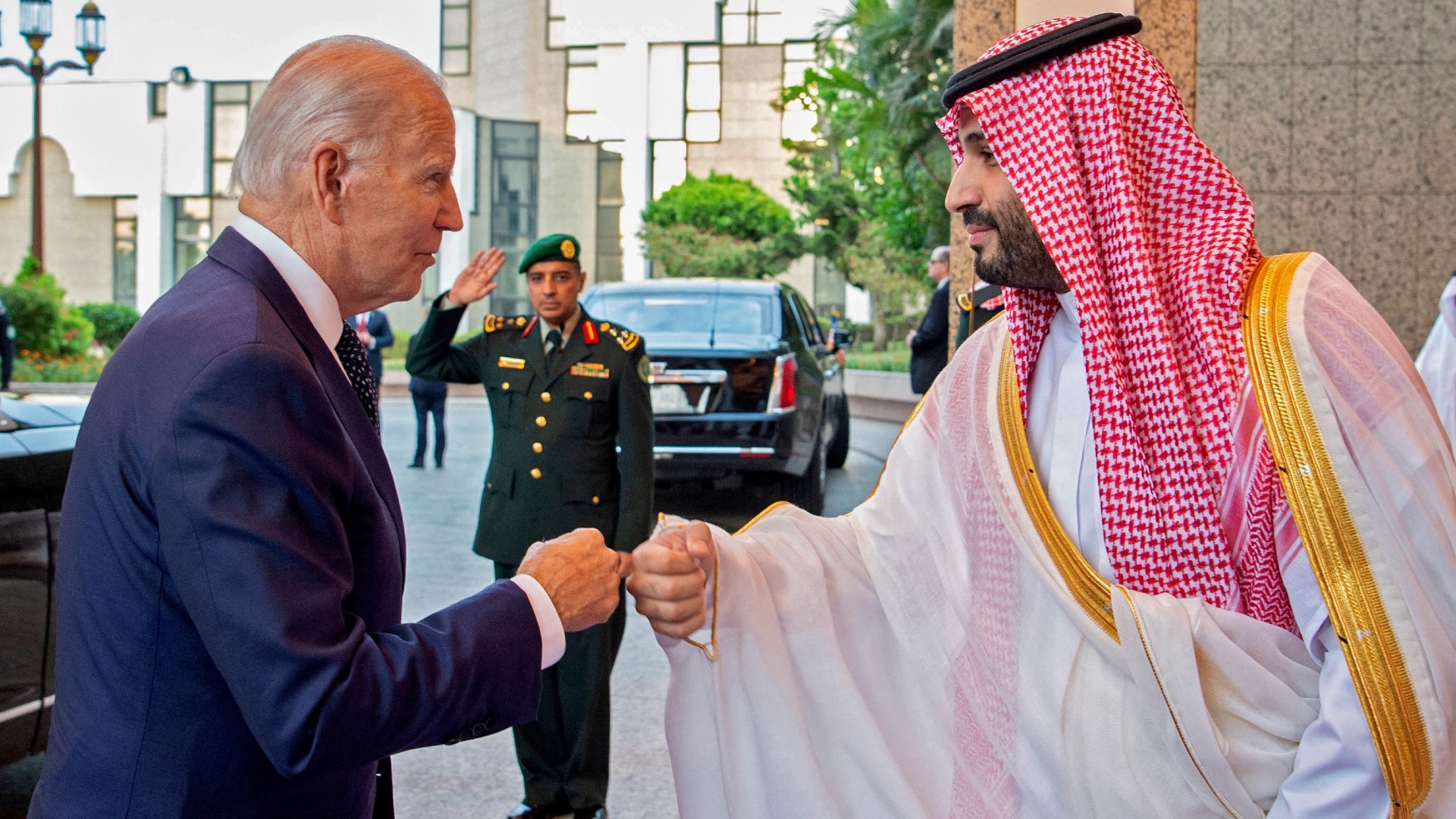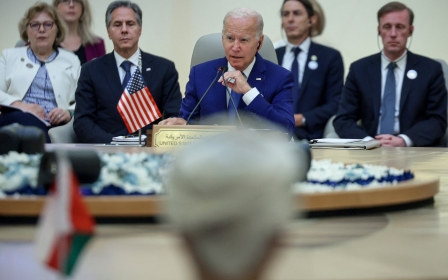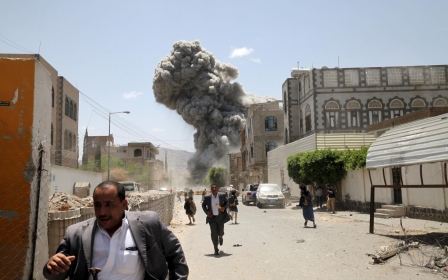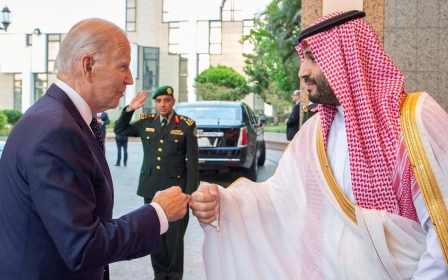'Outmaneuvered': Three takeaways from Biden's visit to Saudi Arabia

The photo of US President Joe Biden bumping fists with Saudi Crown Prince Mohammed bin Salman has become the defining image of his Middle East tour.
The viral photo did not just capture a remarkable turnaround for a president who had vowed to make a "pariah" out of the Saudi prince for the murder of Middle East Eye columnist Jamal Khashoggi, it also captured the nature of the trip.
Biden stopped off in Israel, the occupied Palestinian territories as well as Saudi Arabia last week, in a visit that was months in the making.
'The president let the world know that there are no consequences for repression'
- Adam Shapiro, Democracy for the Arab World Now
Though his sojourn with the Israelis was warm and his short meeting with Palestinian Authority President Mahmoud Abbas invariably inconsequential, it was his trip to Saudi Arabia that was most noteworthy.
Under pressure from the American public to find a quick fix to record inflation figures, the highest in four decades, Biden's travel plans were met with scorn across the political spectrum.
New MEE newsletter: Jerusalem Dispatch
Sign up to get the latest insights and analysis on Israel-Palestine, alongside Turkey Unpacked and other MEE newsletters
Right-wing commentators and politicians said that if he needed oil, he could have travelled to Texas instead. The American Left said Biden's visit would legitimise Riyadh as the war in Yemen rages on. And Saudi activists who have been pushing for justice for slain journalist Jamal Khashoggi said they felt betrayed.
While the visit was likely to lead to some criticism, here are three reasons why the trip could hurt Biden moving forward:
1. Burying Khashoggi
Biden's decision to meet with bin Salman appeared to be an attempt at finally burying the hatchet over the 2018 murder of Khashoggi.
In his comments following a closed-door meeting with the crown prince, Biden told reporters he brought up the gruesome killing with the de-facto Saudi leader.
He said he "indicated" to bin Salman that he held him "personally responsible" for the killing. He added that the Saudi crown prince repeatedly denied responsibility.
Later, the Saudi government disputed Biden's version of events, with Saudi foreign minister Faisal bin Farhan recounting that the crown prince told Biden that just as the US government makes mistakes and "holds itself accountable, the kingdom has done exactly the same".
Biden had only just arrived from Israel where he side-stepped the murder of Palestinian journalist Shireen Abu-Akleh, who was killed by an Israeli sniper in May.
Adam Shapiro, director of Israel-Palestine advocacy at Democracy for the Arab World Now (Dawn), told Middle East Eye that the US president's visit to the region "only served the interests of human rights abusers and those who are responsible for death and devastation across the region".
"From giving Israel a pass on the killing of Shireen Abu Akleh - an American citizen - to appearing to absolve Mohammad bin Salman of responsibility for the premeditated murder of Jamal Khashoggi with a fist bump, and putting the interests of weapons manufacturers and oil companies above everything else, the president let the world know that there are no consequences for repression," Shapiro said.
With the American government unwilling to hold the Israelis accountable for the murder of Abu Akleh, also an American citizen, the Saudis had spun themselves a PR coup. They were, as Shapiro put it, "outmanoeuvred".
It was now in Biden's immediate interest to find closure for both the US and Saudi Arabian governments and bury Khashoggi.
2. American media obsessions
Shortly after arriving in Jeddah on Friday, Biden greeted the crown prince with a fist bump.
For the next day, mainstream US media immediately resorted to painstakingly dissecting the gesture as if it had sullied America's reputation.
The invasions of Iraq and Afghanistan, torture camps, extra-judicial killings and drone strikes were forgotten. Even more so was America's role in the Saudi-led coalition's devastating seven-year war in Yemen.
"Biden doesn't give a hoot about the Yemeni people's suffering and the bloodshed," Anees Mansoor, a Yemeni activist and head of the Hona Aden Center for Strategic Studies, told MEE days before the trip.
In fact, even as most networks and newspapers continued to labour over the fist bump, Biden and the crown prince agreed to accelerate air defence cooperation throughout the course of their meeting.
In a read-out supplied by the White House, the Biden administration said it was "committed to advancing a more integrated and regionally-networked air and missile defence architecture and countering the proliferation of unmanned aerial systems and missiles to non-state actors that threaten the peace and security of the region".
"This cooperation includes US military support and far-reaching foreign military sales cases with emphasis on defensive systems and advanced technology," the statement read.
The US also signed two bilateral agreements on cybersecurity, involving Saudi Arabia's National Cybersecurity Authority, the Federal Bureau of Investigations and the Department of Homeland Security’s Cybersecurity and Infrastructure Security Agency (CISA).
Nazia Kazi, associate professor at Stockton University in New Jersey, told MEE that the depiction of the US as a purveyor of human rights was a common mistake when reporting on the fist bump.
"American analysts make a huge mistake when they ask why Biden isn't, for instance, doing more to hold MBS 'accountable' for his egregious violations of human rights (not limited to the Khashoggi killing)," Kazi told MEE.
"Such a narrative of "accountability" overlooks the fundamental, symbiotic relationship between Saudi repression and US foreign policy: the US is not an accidental sponsor of Saudi brutality, but its careful author.
"And the whimsical fist bump between MBS and President Biden reveals what by now should be a well-known fact: American support for Saudi Arabia is a feature, not a glitch, of US foreign power," Kazi added.
3. Returning without resolution
The US government said Biden was travelling to Riyadh to recalibrate its relationship with the crown prince in order to provide some relief to Washington’s burgeoning energy concerns prompted by Russia's invasion of Ukraine.
But the visit did not yield any tangible outcomes and Biden left without any solid commitments regarding this particular matter from the crown prince.
Several observers said this was to be expected.
"Saudi Arabia prefers to manage the market through the Organisation of the Petroleum Exporting Countries and allied producers (OPEC+), not through unilateral moves," Ben Cahill, a senior fellow at the Center for Strategic and International Studies, wrote a few days prior to Biden's visit.
This means Biden went with little expectation that he would return with encouraging news for the American people on the question of gas prices. In fact, on his return to the US, the price of oil invariably spiked.
Moreover, Bloomberg reported on Monday that the benefits of a production hike would only really reach US consumers by November when the US is scheduled to have mid-term elections. By then, it might be too late for Biden to have convinced Americans to keep the Democrats in the House and Senate.
While the trip had been justified as a means to lower the price of gas for American consumers, Biden had travelled on a completely different pretext. Resuscitating ties with Riyadh, then, was America's attempt to keep Russia and China at bay in the Middle East.
"We will not walk away and leave a vacuum to be filled by China, Russia or Iran," Biden said during his meeting with leaders of several Gulf states in Jeddah.
While the US has imposed sanctions on Russia, states including China, India and several Arab countries continue to purchase Russian oil, and there was no indication that the US managed to persuade any Gulf state to stop.
Over the weekend, The New York Times reported that the visit appeared to be "part of a larger Biden administration effort to begin pushing back on Beijing in parts of the world where for years the Chinese government has made progress without feeling much competition".
"Through cosying up to apartheid and authoritarianism, and normalising and legitimising war criminals, Biden once again showed that the US government's declarations about the need for respect for human rights and abidance by international law are nothing but a laughing matter," Azadeh Shahshahani, Legal & Advocacy Director at Project South, told MEE.
Middle East Eye delivers independent and unrivalled coverage and analysis of the Middle East, North Africa and beyond. To learn more about republishing this content and the associated fees, please fill out this form. More about MEE can be found here.





